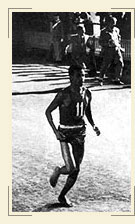|
 Abebe
Bikila
Abebe
Bikila
In the history of the Olympic Games many great long-distance runners excelled in the marathon. One of them was the Ethiopian marathon runner  Abebe Bikila. Abebe Bikila.
Born in August 1932 in Jato, near Addis Ababa, he took up sport at the age of twenty years old, when he became a member of the palace guard of his country. His fellow countrymen saw his great talent in the long distances in 1956. The 24-year-old Abebe Bikila, participating in the championship of the armed forces of Ethiopia, succeeded in not only winning the marathon race but also beating a prominent Ethiopian athlete, Wami Biratu, who was the holder of the national records in the 5,000m and 10,000m events.
However, his reputation exceeded the narrow limits of his country by his participation in the Olympic Games of Rome. It was only the third race in the marathon for Abebe Bikila, who was an officer of the palace guard of Haile Selassie by that time. He even preferred to run barefoot, to which he had been accustomed during his hard training, the programme of which required this method. The "barefoot prince" - as he was later nicknamed by the journalists - competed following successfully a specific tactic. More precisely, together with his Swedish trainer Onni Niskanen he planned to let his opponents lead the race and wait to take the lead only two kilometres before the finish. The mark for accelerating his pace was fixed at the location where had been put up an obelisk that had been transferred by the Italian troops as loot from Ethiopia after the war between the two countries in 1939. Later many observers of the Games interpreted that as a symbolic protest for the theft, as Ethiopia had considered it, of that monument. The above tactic was very efficient and as a result Bikila became first Olympic winner in the marathon.
After the Games of 1960 and until the Tokyo Olympics in 1964, Bikila's competitive activity had not offered him any significant distinctions. Many people believed that he would participate in the Olympic Games of Japan for the sake of appearances only, seeing that a few weeks before the beginning of the Games he had his appendix removed. Nevertheless, Bikila proved them wrong; he succeeded in becoming first Olympic winner again and even achieved a world record.
However, the years that followed had unpleasant surprises in store for him. In 1969 he was seriously injured in a car accident and remained disabled for the rest of his life. Since then he had been involved in paraplegic sport until his death from cerebral haemorrhage, in October 1973.
|